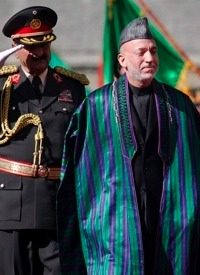
Afghanistan is seen as the second most corrupt country in the world according to Transparency International, trailing behind only Somalia. Iraq did not fare much better in the rankings, coming in three spots behind Afghanistan at number five.
Transparency International (TI), a watchdog of governmental openness and integrity, released their 2009 Corruption Perceptions Index (CPI) on November 17. Transparency International bills their CPI as a “survey of surveys.” Referring to 13 independent surveys, the group collates the data and estimates the confidence of the country ratings.
The watchdog cautions that its rankings do not directly correspond to the amount of corruption in a country because there would be no reliable way to measure that. For example, if a country is corrupt, the number of public officials it has convicted for corruption might actually represent opposition members being persecuted rather than guilty parties being punished.
Transparency International instead measures the perceived corruption, something akin to judging how trustworthy a nation’s citizens perceive their government to be. The group deals only with corruption in the public sector, and defines corruption as “the abuse of public power for private benefit.” This includes such things as “bribery of public officials,” “kickbacks in public procurement,” and “embezzlement of public funds.”
The CPI also considers “the strength and effectiveness of public sector anti-corruption efforts,” which allows the rankings to cover “both the administrative and political aspects of corruption.” Although the rankings reflect only data that is considered to be reliable, this does not mean, for instance, that New Zealand, the number one country with the least perceived corruption, is a paragon of virtue. Corruption will rear its ugly head anywhere from time to time.
Even the United States is not immune, though that is no surprise to anyone who follows the national news. America came in at number 19, not even making it into the top 10 percent of the 180 nations surveyed.
But unfortunately for Afghanistan, corruption’s ugly head seems to stay reared most of the time; the war-torn nation fell from being the fifth most corrupt last year to the number two spot this year. “Examples of corruption range from public posts for sale and justice for a price to daily bribing for basic services,” TI said of Afghanistan. “This, along with the exploding opium trade — which is also linked to corruption — contributes to the downward trend in the country’s CPI score.”
The BBC on November 18 noted: “This is not a new problem in a society once based on clan patronage. What is new is that it has become a political obstacle both for the Afghan government and for the countries whose soldiers are dying in its defence, most notably from the US and Britain. It has gathered pace after the corruption uncovered in the presidential election.”
Afghan President Hamid Karzai is now establishing his third anti-corruption task force. “The first was disbanded when it was revealed that its head had been imprisoned on drugs charges in the US,” the BBC noted.
“Words are cheap. Deeds are required,” declared U.S. Ambassador to Afghanistan Karl Eikenberry, who advised President Obama not to send any more troops until the rampant corruption is addressed.
Even better, bring the soldiers currently stationed in Afghanistan home. American sons and daughters, mothers and fathers, are dying for two nations that rank among the five most corrupt in the world. Their blood is too precious to be spilled propping up criminals.
Photo of Hamid Karzai: AP Images



